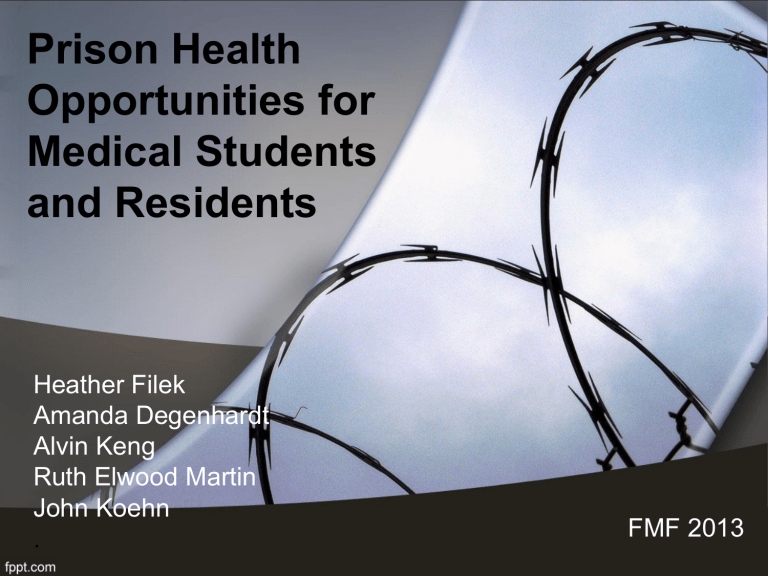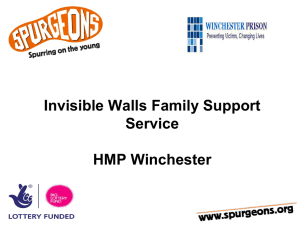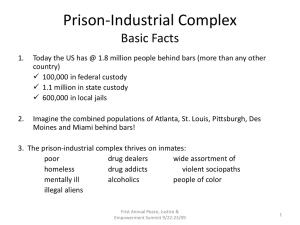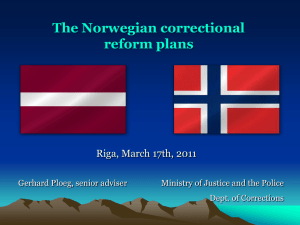Prison Health Opportunities for Medical Students and Residents

Prison Health
Opportunities for
Medical Students and Residents
Heather Filek
Amanda Degenhardt
Alvin Keng
Ruth Elwood Martin
.
John Koehn
FMF 2013
Health Advocacy
“Physicians are the natural attorneys of the poor, and social problems fall to a large extent within their jurisdiction.”
- RUDOLF VIRCHOW
Health Advocate Role
Definition: As Health Advocates , physicians responsibly use their expertise and influence to advance the health and well-being of individual patients, communities, and populations.
Frank et al, CanMEDs, 2005.
Incarceration in Canada
• Approx 54,498 individuals in custody
• Higher prevalence of mental illness and substance use disorders
• First Nations over represented
Stats Canada; 2010/11.
Go directly to jail…
Objectives
1. Review CanMEDS competencies that prison health educational opportunities can foster.
2. Understand the opportunities available for medical students and residents.
3. Network with others who are interested in prison health education.
History of the
Prison Health
Project
.
Amanda Degenhardt
University of British Columbia
MSI 4
FMF 2013
Hx of Prison Health Program
• 2 nd year of medicine —CSLO
• Started 5 years ago
• Initiative to present inmates with information on health and infectious diseases
• Unique and marginalized population.
• Groups of two to deliver 1 hr presentation
• Audience: ~12-15 inmates
• Locations: Fraser Regional Corrections
Centre(FRCC), North Fraser Pre-trial Centre
(NFPC), and Alouette Correctional Centre for
Women (ACCW)
Locations
Green = Federal
Yellow = Provincial
Red = Forensic Psychiatric Hospital
Blue = Youth Custody
Hx of Prison Health Program
• The prison population has unique health needs:
– Mental illness
– Poverty
– Addictions
– Infectious diseases
• Restricted access – limited knowledge of the health and human rights concerns of prisoners
• Developing student deliverables
• Over the years project development progressed:
– BC Corrections relationship
– Module Content
– Memorandum of Understanding (MOU) to formalize students’ relationship with BC Corrections
– Expansion into the Juvenile institutions
Modules Developed
• Navigating the Health Care System
• Mental Health
• Basic Hygiene
• Women’s Health
• Infectious Disease
• Health & Your Child
• Sexual Health
Challenges with Presentations
• More examples pertinent with the prison population
• Mental health had basic science – kept it more “big” picture
• Careful that photos aren’t “triggers” or too extreme as this illicit disruptions
• Remove medical jargon
Pilot Project
• Adapt and deliver youth targeted health modules (basic hygiene, sexual health, navigating the health care system) to juvenile inmates at the Burnaby Youth
Custody Services Centre
• More relaxed atmosphere
• More time spent on Q&A
• Health Jeopardy
Following pilot
• Well received and felt this could be an independent CSLO
– Safe Relationships (Harassment, Abuse, Neglect and Positive
Role Models)
– Sexual Identity
– Mental Health (Body Image, Self-Esteem and Bullying)
– Mental Health (Depression, Anxiety, Bipolar, Psychosis, Suicide)
– Addictions (Drugs, Alcohol and Smoking)
– Nutrition and Exercise
– Dental Health
– Sleep and Growth
– Body Modification (Tattoos, Piercings)
– Risky Behaviour, Accidental Injury and Prevention
Personal Experience
• Youth – a lot of food for thought
– How do we stop them from entering into the juvenile system?
Once in, how do we stop the cycle?
– What is my role as a member of the community and as a health care professional
• CanMeds
– Communicator
• Listen effectively to elucidate concerns and address them
• Nonverbasl cues
• Safe environment to talk – confidentiality and rapport
– Advocate
• Community resources
– Medical Expert
• Explain and provide information to both child and parents to better understand the issue they have come in with
Personal Experience
• Incarcerated individuals are marginalized population that is unheard
– Not allowed dental floss (potential weapon)
– No access to dental care
• Lack of awareness of health care rights
– Fear or discomfort sharing personal information
– When it’s appropriate to see a doctor
– What a good patient-physician relationship looks like
• Acted as a health advocate – health promotion and disease prevention
Future Effect on my Medical
School Experience
• 3 rd year of clerkship was in an integrated community clerkship
• Weekly family practice office managed transition houses therefore some patients were previously incarcerated
• Allowed me to be open and accepting of the patients
• Cohesive relationship to address their needs which include acute and longstanding issues
Prison Health
Project 2012/13
Alvin Keng
University of British Columbia
.
MSI 3
FMF 2013
Prison Health Project in 2012-
13
• Inherited the project from medical students of prior year
• UBC Medicine Year 2: Doctors, Patients and Society (DPAS) course - Community
Service Learning Option (CSLO)
• Team of 7 students in 2012-13
Locations
• Essential Skills to Success
– Fraser Regional Corrections Centre
– North Fraser Pre-Trial Centre
– Alouette Correctional Center for Women
– Surrey Pre-Trial Services Centre
• Burnaby Youth Custody Services Centre
Existing Modules
• Navigating the Health Care System
• Mental Health
• Basic Hygiene
• Women’s Health
• Infectious Disease
• Health & Your Child
• Sexual Health (at Burnaby Youth Custody
Services Centre)
Navigating the Health Care
System
• Explained the health care system in BC with a focus on a community POV
• Sample topics: how to find a family doctor,
MSP, Pharmacare, how to get the most from a doctor’s appointment
Mental Health
• Discussed common mental disorders and how to stay healthy mentally
• Sample topics: depression, bipolar disorder, anxiety disorders, substance abuse, recognizing suicide risk, staying mentally health in prison and in the community
Women’s Health
• Discussed different areas of women’s health pertinent to incarcerated females
• Sample topics: STIs, breast cancer, the well woman exam, contraception
Infectious Diseases
• Reviewed common infectious diseases, modes of transmission, prevention & treatment
• Not presented in 2012-13
• Sample topics: HBV, HCV, HIV, Scabies,
Lice, TB
Health & Your Child
• Discussed healthy pregnancies, young child development, and healthy lifestyles
• Sample topics: when to see a doctor during pregnancy, nutrition and healthy living tips, dangers of cigarettes, alcohol, drugs in pregnancy, child nutrition
Sexual Health
• Developed for youth to discuss common
STIs, and prevention, prevention, prevention!
• Sample topics: Gonorrhea, chlamydia,
HPV, herpes, HIV, contraception, prevention
New Modules for 2012-13
• Self Care
• Substance Abuse
• Men’s Health
Self Care
• Discussed self-care and its relationship to health
• Rationale: Rehashed basic hygiene module to include nutrition and sleep hygiene
• Sample topics: nutrition, preventable communicable diseases, exercise, sleep hygiene, stress relief
Substance Abuse
• Reviewed common substances of abuse and their impact on health
• Rationale: Identified as a gap by our community partner
• Sample topics: Sleeping medications, anabolic steroids, acetaminophen, cocaine, etc.
Men’s Health
• Discussed major health issues affecting men,
• Rationale: Identified as a major gap and area of interest
• Sample topics: “The Big 5”, testicular disease, prostate disease, the importance of screening, sexual dysfunction
• Men’s Health Initiative of BC
Lessons for the Future
• Inmates have unique needs and restrictions
• Connection to the outside community
• Engaging inmates in their health
• Measurable impact
• Prison is a unique community with nuances difficult to understand for an outsider
Students’ experience of prison health education during medical school
Heather Filek
University of British Columbia
MSI 4
Filek H et al. Med Teach. 2013 Nov;35(11): 938-43
FMF 2013
Purpose
• Social responsibility is a core component of medical education 1 – how are students learning to be socially responsible?
• CanMEDS competencies:
– Health Advocate, Communicator, Collaborator
• Purpose of the study: to explore the impact of pre-clinical prison health education on medical students
1 Faulkner, L., McCurdy, R. (2000) Teaching medical students social responsibility: the right thing to do. Academic Medicine, 75(4): 346 - 350
Methods
• Students and residents who participated in the DPAS420
CSLO Prison Project as 2 nd year medical students.
Recruitment via invitation email; convenience sampling
• 10 in-depth interviews
• Each interview audio-recorded and transcribed verbatim
• Analysis via interpretive description, a method to “capture themes and patterns within subjective perceptions 2 ”
• UBC Behavioural Research Ethics Board certificate of approval was obtained
2 Thorne, S. (2000). Data analysis in qualitative research.
Evidence Based Nursing, 3,
68-70
Findings
Four main themes were identified as the major impacts of being exposed to the prison population during medical school training
Theme #1
Exposure to incarcerated populations increases students’ insight into issues that diverse marginalized sub-populations encounter
“the value of having prison health as part of medical school would be that it exposes you to more or less every marginalized population you could imagine. It’s the immigrants, it’s women, it’s homelessness, it’s aboriginal, it’s drug addicted…”
Theme #2
Positive interactions with the incarcerated individuals enhances relationship building
• Received warm welcome from incarcerated individuals
• Positive relationships between inmates and future HCP
“We got really good feedback from the inmates themselves…that positive interaction was something we’d hoped to foster.”
Theme #3
Collaboration reinforces teamwork skills
• BC Corrections
• Prison wardens & guards
• Health Care in correctional facilities
• UBC faculty
“It’s just like the hospital where things function a lot more smoothly when everyone from the team gets along. And respects one another.”
Theme #4
Community placements garner important learning opportunities within the medical school curriculum
“It’s experiences I can tie back to when I come into contact with patients who have been through the prison system.”
“It’s not something you can learn in a textbook….it’s only through interacting with the people that you can break down the stereotypes that you have and feel more comfortable interacting with that population.”
Conclusion of study
Findings = CanMEDS competencies (Health
Advocate, Communicator, Collaborator)
Our findings demonstrated that pre-clinical exposure to incarcerated individuals and prison health education provided a unique setting for medical students to develop an increased sense of social responsibility and accountability.
“So I think I developed a sense of compassion for a group of people that I didn’t previously understand as well.
Hopefully that makes me a better physician for that.”
.
Opportunities abound!
1. New Prison Health Advocacy Elective
2. Regional shadowing opportunities
3. Health promotion projects
4. Research
FMF 2013
Prison Health Advocacy
Elective
• 4-week elective rotation through UBC
• Emphasis on the health advocate role
• Embedded cultural competency certification
• Multi-site options
Shadowing
• Representative prison physicians on SIFP committee from every region of Canada
– Kingston, ONT
– St. John’s, NFLD
– St. Albert, SASK
– Vancouver, BC
Health Promotion
• Established projects in BC
• Support for distributed initiatives through the
Collaborating Centre for Prison Health and
Education
Research and Policy
• Working groups established to contribute to position papers on issues:
• Segregation
• Access to effective addiction treatment
A National Conversation
• Physicians working in prisons have a unique skill set
• Learners have potential to contribute a great deal
• Well positioned to advocate for change
Thanks!
•Questions
•Comment
•Share contacts
•Ben: prison.elective@familymed.ubc.ca





